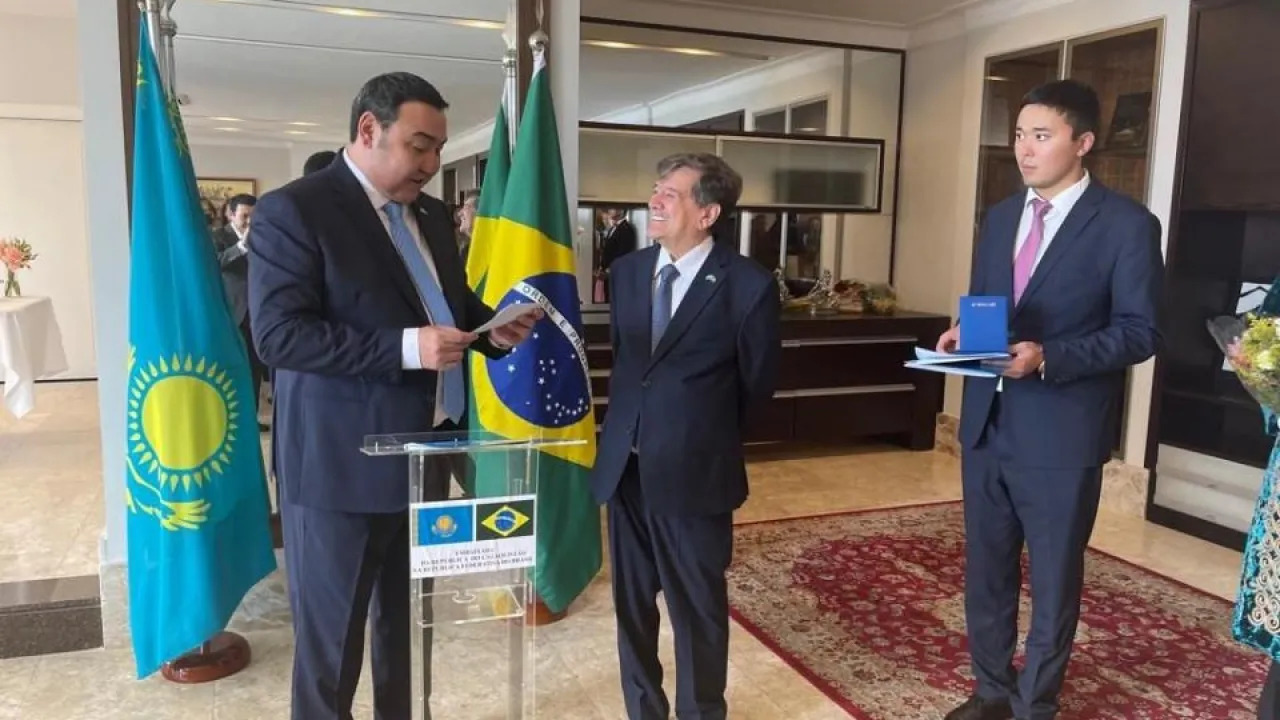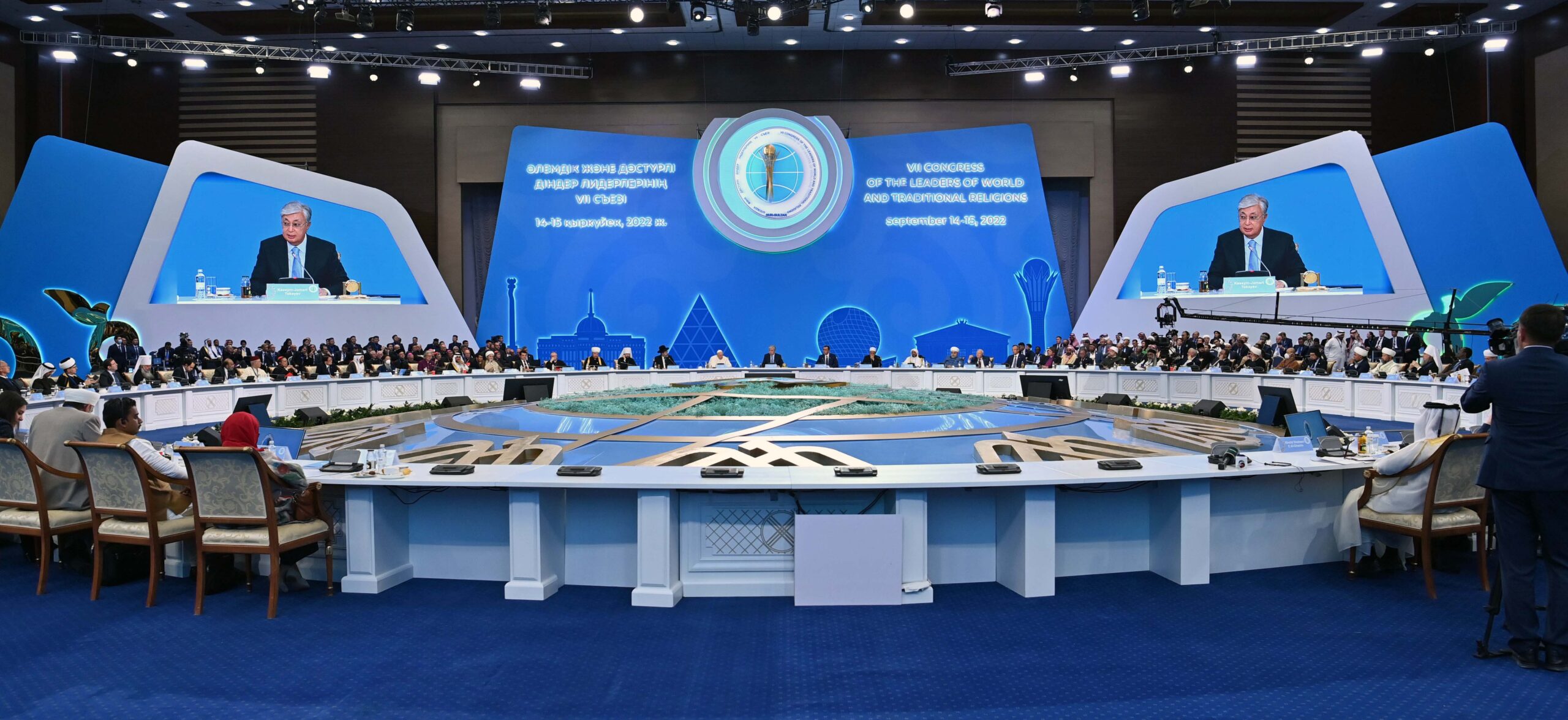ASTANA – Ulisses Riedel de Resende, a former Brazilian senator and the president of the Planetary Union (União Planetária), has played an important role in enhancing Kazakh-Brazilian relations. The Planetary Union, a non-governmental, non-profit civil society organization, engages in social, educational, and environmental projects.

The Embassy of the Republic of Kazakhstan in the Federal Republic of Brazil congratulates the politician of Brazil, Honorary President of the Planetary Union of Brazil, President of the Kazakhstan-Brazil Friendship Forum, ex-Senator Ulisses Riedel de Resende on the high award of the Republic of Kazakhstan. Photo credit: dknews.kz
Last year, Riedel was awarded the Dostyk Order of the second degree by the decree of President Kassym-Jomart Tokayev for his contribution to strengthening and developing Kazakh-Brazilian relations.
In an interview with The Astana Times, Riedel discussed the union’s goals, notable events, and partnerships in Kazakhstan, as well as navigating the intersection of media, spirituality, and social responsibility in professional endeavors.
The Union’s philosophy and mission

Ulisses Riedel de Resende. Photo credit: ncst.org
Founded in 1997, the Planetary Union aims to construct “a new virtuous model of civilization” to make life more beautiful through love and universal brotherhood.
“To achieve this goal, our organization strives to ethically elevate the world’s mentality, shaping humanity’s collective consciousness through various projects. The organization’s main activity is to support the global movement for peace throughout the world,” said Riedel.
Riedel emphasized the union’s philosophy of dialogue and understanding, noting that ethical values are achieved rather than imposed.
“The organization argues that action should be through the loving conquest of minds and hearts, avoiding criticism and confrontation, and respecting all existing understandings,” he said. “Aiming for world peace, harmony between nations and international cooperation, it works to foster interreligious and intercultural dialogue.”
Broadcasting ethical values
Riedel also discussed Brazilian TV Supren, an educational and cultural television channel aimed at supporting the global movement for the renewal of social structures and ensuring civic solidarity.
“Its main objective is to disseminate the good news and educational, cultural, philosophical, and self-knowledge content that promotes dialogue and reflection and encourages good actions through inspiring examples and uplifting stories,” he said.
TV-Supren, which launched a YouTube channel in 2011 with almost 100,000 subscribers, produces content aligned with the Planetary Union’s ethical and humanitarian values. It stands out in Brazil for its dedication to high values and building an ethically aware and engaged society.
“TV-Supren focuses on elevated themes such as supra-partisan politics, spirituality, health, a culture of peace, self-knowledge, human development, the environment, and the animal world,” said Riedel. “Its programming promotes social welfare, ethical and moral education, and dialogue between different individuals, cultures, nations, and religions.”
Strengthening bilateral ties
The Planetary Union has participated in the Congress of Leaders of World and Traditional Religions in Kazakhstan and other related events, such as the recent Our Common Home roundtable in Rome.

Kazakh President Kassym-Jomart Tokayev gives a speech at the closing ceremony of the seventh Congress of the Leaders of World and Traditional Religions on Sept. 15, 2022. Photo credit: Akorda press service
In 2018, Riedel attended the congress, noting Kazakhstan’s initiatives in global security, including nuclear disarmament and organizing events for peace and stability.
“These events highlight the importance of platforms where religious and community leaders can share perspectives and work together to solve global problems such as religious intolerance, social injustice, and environmental degradation,” he said.
Inspired by his participation in the working group meeting of the Secretariat of the Congress of Leaders of World and Traditional Religions in 2010, Riedel wrote “Spiritual Ecology – Genealogy of the Soul,” a book available in Portuguese and English.
He also mentioned the World Spiritual Forum in Brazil in 2006, which was well-received and featured prominent national and international speakers.
“Events like these should be increasingly promoted by society because they help in the search for harmony between different religions, traditions, customs, nations, and philosophical thoughts,” he said.
The union’s key initiative in Kazakhstan was an agreement with the Nazarbayev Center in 2023, aimed at working for world peace. This partnership fosters understanding and cooperation between different cultures and religions, addressing global peace and cooperation issues. The Science of Peace project emerged from this partnership, mobilizing leading universities and brilliant minds to promote studies and publications on peace.
“Through scientific knowledge, we actively contribute to building a new civilizational paradigm based on virtues, civility, dignity, and humanism,” Riedel said. “The plan is to create Multidisciplinary Study Centers within universities, providing an inclusive space for reflection and concrete actions for peace.”
Established in 2022, the Kazakhstan-Brazil Friendship Forum strengthens bilateral cooperation, promoting Kazakh culture and traditions in Brazil and enhancing bilateral relations.
“These activities not only promote understanding but also develop practical solutions to global challenges, reinforcing an ethical and inclusive mindset,” said Riedel.
Integrating media, spirituality, and social responsibility
Riedel highlighted that navigating the intersection of media, spirituality, and social responsibility involves a continuous commitment to integrity and ethics in all communications and initiatives.
“I firmly believe in the transformative power of the media, capable of shaping mentalities and positively influencing society, promoting high values and encouraging the building of a more just and compassionate world,” he said. “We committed to truth, transparency, and integrity, avoiding sensationalism and negativity, and highlighting inspiring stories, examples of good practice, and content that encourages reflection and self-knowledge, manifests the intersection between media and spirituality.”
According to Riedel, social responsibility is another fundamental pillar, as they use the media to address social and environmental issues, promoting awareness and positive action.
“Programs focused on environmental education, social inclusion, human rights, and social justice are central to our programming. We offer a space for the expression of diverse voices and perspectives, promoting mutual understanding and respect between communities, contributing to building a more harmonious society,” he said.
